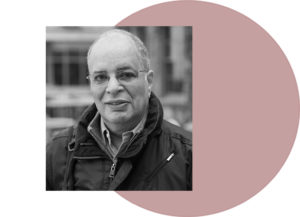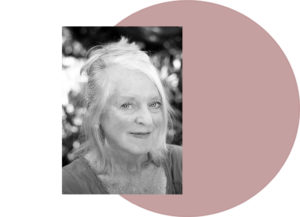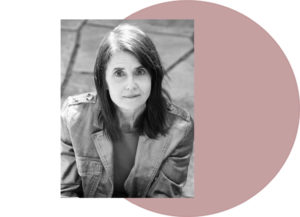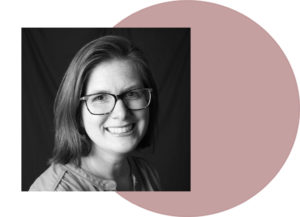FICTION
from Away to Stay
(Novel Excerpt)
by Mary Kuryla
Bodies clunked against the door. Bodies clunked and flesh stuck in wet leaves to the window. Rocking, really. Really, it was more of a rocking, how the man and the woman propped themselves against our car to kiss. His thick braid smeared the glass, a strip at the car wash. Our car was for their bodies only. The man and woman probably did not have anywhere else to be anymore than I
did. If they had known I was in the car, if they had known I watched from inside, it might have reminded them of not having somewhere better to be. What they wouldn’t do then.
They did not look inside the car. They did not even look at each other. Once I thought our eyes met, the woman’s and mine, but her eyes went soft and the lids closed. I drew my jacket closer around me. Maybe she was okay with using our car like it was hers. Maybe the car felt natural. That was the thing with being on the streets. Everything out here belongs to you and any place is as good as another for private doings.
The lot in Griffith Park was dim. Streetlights dripped milky over the cookout grills, where coyotes gathered, ashes poofing around their sharp snouts. In twos and threes, the coyotes slinked out of the woods. Not the sort to stay in houses. Mom had gone downtown by bus, but I stayed in our car in the lot in Griffith Park. She called me from the bus. “Stay in the car,” Mom said. “It will not take long to convince Misha.” Mom planned to ask the great dancer Mikhail Baryshnikov for help with getting into a dance company, and he would do this because of Vaganova Ballet Academy in Russia. Graduates of Vaganova’s do for each other.
After Mom left, I made it look like Mom was sleeping in the backseat in case anyone spied inside our car. I made Mom with a bed sheet and a lank leather belt stretched tight over a duffle bag. Then I got under my jacket and tucked inside the front seat floorboard to wait. I might have slept. But bodies clunked against the door.
The man peeled the woman off him and stuffed her against the window. Now she was his pillow. Abstain from blood, and from things strangled… The Bible says such things of the doings of a man and a woman. Not for my eyes. Her cheek buttered the glass. Little bubbles popped on her lips. He was grunting and rubbing her with his hundred hands. His eyes ranged white. He set his face against hers until his eyes fixed. He pushed her out of the way. He dropped a hand on the glass, raised the other to shade his eyes, and peered in, like he had to see past his own image to make out the other pair of eyes inside. The man drew away, yanking the woman with him, but the woman stuck to the glass, squinting in. “She saw us!” she hollered, twisting in his arms. Her fist pounded the window above my head. “Saw us!”
Pounding and pointing at me. “You like to watch?”
“What happened at the park last night?” Mom says. She knows I have not told her everything.
When I do not answer, Mom says, “I should not have left you alone.”
“I was not alone.”
Her eyes slide toward me.
“Coyotes,” I say. “They live in the park.”
“That makes me feel better? Coyotes protect you?” She lifts her arm off me. “Why you not call me right away?”
“Because a little light in a car is just what they look for.”
She touches my cheekbone. “Why get out?”
Here we go.
“I told you always stay in car,” she says. “You are safe in car.”
“I was not supposed to be there,” I say.
“Sure. No one should be alone in car. But you know I was hoping to talk to Misha.”
She points to my bruised eye. She says, “What else you not told me?”
Flushed with the faith that I can finally stop Mom from prying, I say that it is true, I have not told her everything about what happened when she left me the other night. The truth is that the two outside our car in Griffith Park were not people at all. They were coyotes and they took turns looking in through the windows, their canines dripping, eyes rising like mercury through their skulls, their tails lifted behind them as if strings drew them up. All I had to do was catch their eye, tell them what I wanted, and they would swing open the doors and together we would rise above the parking lot, the pine trees, the observatory on the hill, higher and higher, until the park was just a patch below us and the astronomer at his telescope would mistake us for a star.
“So nothing happened,” Mom says.
“But it could have.”
A mother’s job is to know her child. Some mothers are better at this than others. Mom is perfect at her job. She is always right about those things held in secret. Mom knows that when I do not want to talk about something I feel sorry about, I make a joke or invent a story. After all, I picked up the trick for hiding stuff from her. I have not told her everything, except that a man threw a rock at the passenger window. But I did not tell how it was the woman who reached through the broken glass to unlock the door, how the woman caught my ankle on my way out the other side. Screaming the whole time at the man to hold me. Climbing on top of me, the chains of her necklaces throbbing round her neck, her bracelets carving my bones as she pushed down my shoulders. The seat leather slippery beneath me. She smelled of ashes and something female, the hot powder of her mouth shouting at my face, “Like to watch? You want in on this? You, dirty little spy!”
The man held my knees. The black strip of hair swinging in his eyes.
“Now you’ve done it,” the woman whispered. “Now you’ll have to pay.”
“She’s a fucking mustang,” the woman told the man. “Hold her. That kick.” How could he tolerate a dirty spy watching what they do? “Hurt her,” she said. “Hurt the little pony.” She fell out the door lunging at the man. He let go of my legs. His eyes tucked behind the black hair.
He let go.
Slam down the handle. Roll out the other door. Hit the blacktop. Silence sucked out. In this vacuum a damp hand closed around my shoulder. Might have been his. Or just the dark holding on. Never ran so fast. Wind drying the sweat I had not known I was soaked in, the park lights blinding. Did not see it coming. Smack, straight into a tree.
Mom figured right. The black eye came of making the man and lady angry. The sorry truth was, I wanted to look at them, wanted to get a really good look at what they were at. How can I tell Mom that instead of bolting from the car and running while I still had a chance, I stayed to watch?
 Mary Kuryla’s stories appeared most recently in The Paris Review, Conjunctions, Agni, and Epoch. They have received The Pushcart Prize and the Glimmer Train Very Short Fiction Prize. Her collection Freak Weather: Stories was selected by Amy Hempel for the AWP Grace Paley Prize in Short Fiction and published by University of Massachusetts Press. Her novel Away to Stay is out now from Regal House Press.
Mary Kuryla’s stories appeared most recently in The Paris Review, Conjunctions, Agni, and Epoch. They have received The Pushcart Prize and the Glimmer Train Very Short Fiction Prize. Her collection Freak Weather: Stories was selected by Amy Hempel for the AWP Grace Paley Prize in Short Fiction and published by University of Massachusetts Press. Her novel Away to Stay is out now from Regal House Press.
Fiction Poetry Fiction Nonfiction Nonfiction Fiction

POETRY
The Forty-Fifth President of the United States
by Lester Graves Lennon
“The president has blood on his hands.”
Boston Globe editorial (March 30,2020)
“Beautiful,” often he says,”Beautiful.”
Horror, each with him we see new horror.
Bloodstains on his hands, we see the bloodstains
stain where he touches, everywhere the stain.
His golden sewer voice punching out his
guttural gutter breaths praising his gutter.
Nasty, the women he attacks are nasty.
Loser, the men he fights, always weak losers.
Virus, denied, he makes undenied virus.
Spitting out serpents he climbs his cross spitting
old venoms tailored for old fears, the old
preacher pronouncing damnation. He preaches
protection, only Him for our protection
against fake news, against false facts, against
hoaxes, the lying deep state’s vicious hoaxes.
Shame, he has children caged. He has no shame.
Horror, we live and die with him our horror.
Beautiful, his last hour becomes our beautiful.
Postcard Showing the Lynching of Allen Brooks
March 10, 1910, Dallas, Texas
(photographer unknown)
This is not a postcard from hell. No, this
postcard has proper postage. This postcard
guaranteed by U.S. Mail, guaranteed
safe passage, safe arrival, content safe.
Scrawled message, “…token of a great day,” scrawled
beside one cent Ben Franklin stamp behind
picture of teaming downtown Dallas, picture
taken one Thursday, lunch hour, picture taken:
old Negro hanging beneath Elk’s Arch, old
dead Allen Brooks stripped naked, beaten dead
before he hung. Clothes snatched as trophies before
photographer captured his photograph.
They said he raped a three year old girl. They
said courtroom justice was too slow. They said
hanging was proper work. God’s work was hanging.
Body dark, helpful arrow drawn to body.
Crowd deep in front of camera, two in crowd
look back. They have the father and son look.
Lucille Clifton Haikus
Haiku: February 13, 2015
Five summers ago
Today Lucille Clifton died
Oceans remember
Haiku: June 27, 2015
Mountains remember
Seventy-nine years ago
Lucille Clifton rose
Reworking My Last Poem
I want to join the unity of lines
that speak against the tyranny of lives.
I want my pen to fountain bleeding words
that steal through marble hallways staining lies.
I want to fight the gnawing certainty
that all who speak become unknown, unspoken.
I want to sit reworking my last poem
not knowing the poem knows it is my last.
 Lester Graves Lennon is the poetry editor for Rosebud magazine and an investment banker whose career in public finance exceeds 40 years. His first book of poetry, The Upward Curve of the Earth and Heavens, can be found in 70 public and university libraries including the Los Angeles Public Library, Yale, Oxford and the University of Wisconsin-Madison where he received his B.A. in English. His second book of poetry, My Father Was A Poet, was published in 2013. His third book, Lynchings: Postcards From America, is out now.
Lester Graves Lennon is the poetry editor for Rosebud magazine and an investment banker whose career in public finance exceeds 40 years. His first book of poetry, The Upward Curve of the Earth and Heavens, can be found in 70 public and university libraries including the Los Angeles Public Library, Yale, Oxford and the University of Wisconsin-Madison where he received his B.A. in English. His second book of poetry, My Father Was A Poet, was published in 2013. His third book, Lynchings: Postcards From America, is out now.
FICTION
Dreamies
by Rhoda Huffey
Dream 1
Harry
The first dream, I was young, in my twenties, with skin that held firm. When what happened happened, I wasn’t entirely awake or asleep. I had had a tuna sandwich earlier, whole wheat toast, this was in the desert where together with the man I loved we two had bought a rather small house. I had lain down, which was unusual for me in the middle of the afternoon. I keep trucking. According to the light, it must have been around three. This was summer.
I stretched out on the bed for a moment on the sweet comforter with flowers, the one that was later stolen in the break-in. The bedroom was small, but Harry had installed a huge sliding glass door on the side wall, he did all the work himself. In fact I still have his sledgehammer. He had cancer at the time, so work distracted him. The sliding glass door dropped off to nowhere, a precipitous descent, which gave a pleasing sense of space, plus some danger. That bed, especially with the flowers, was like a cradle. I miss that comforter. The robbers also took Harry’s gun, but that was later.
The bedroom would have seemed small, but the large sliding glass door made it part of something bigger. It dropped off because the house was on a hill, and the remodel wasn’t finished yet. We lived in a state of daily possibility.
I remember the light was shifting, so there must have been some fluffy clouds, unusual for the desert. The sun can be blinding.
Were my eyes closed or open? Although I wanted desperately to be a writer, all my stories hit the wall after one-and-one-half pages. Nothing wanted to happen. I couldn’t continue. My family didn’t like me, they talked to me as if I were a criminal, but my Aunt Gladys, my mother’s sister, liked my paramour Harry. She called him almost daily and read him articles out of the Los Angeles Times. She missed her husband. Like Uncle Andy, Harry smelled like wet grass and was familiar with horses. He had a slight drawl from nature. On this day, I had cut the vegetables for dinner, root stew. This was the actual day we were actually starting macrobiotics. In the big pot I had put turnips, onions, burdock, onions, parsnips, onions, carrots on to simmer with a little water. This food was going to save Harry. While it was on simmer, I went outside and scraped peeling white paint on the house’s shiplap exterior. Whole pieces simply lifted off, loose, but Harry said it might be wasted as we would probably stucco. I scraped like an maniac.
On this day I checked the root stew, then went in and took a shower and put on clean clothes. It was at that point the flowered comforter looked inviting. I have too much energy to relax. But on this day, I moved toward the bed and simply lay down on my back.
Right away I entered the delicious world between sleep and waking. Not a muscle moved. My brain was quiet.
Who knows what time is? I thought of nothing. I had no thoughts, but there was a sense amidst the flowers on the comforter that life was perfect. Out the wall of sliding glass the sky was blue, but not oppressive. I hate rest. But on this day, I closed my eyes and drifted.
“Have you seen my keys?” Harry’s voice crashed in.
At which point all hell broke loose. Harry’s voice had cracked into a top secret location no humans were allowed to enter.
Inside my brain was a long table, and around it were the elves who make the stories. They weren’t exactly elves. They had kept their heads down but they looked up, startled.
I didn’t move.
At the head of the long table, but standing, stood the Story Monster, and he looked exactly like Richard Nixon. He was a Richard Nixon look-alike. He wore a suit from Sears and Roebuck. Beneath the table, his trouser legs were too short so that his colorful socks showed. He was a dork, and yet, he emanated God-like dominion over this room and the stories that were seething but still trapped because they stopped after one-and-one-half pages.
Richard Nixon’s jowls moved back and forth. This wasn’t Richard Nixon.
“Don’t EVER.” Richard Nixon smacked the table so hard the world jumped. No elves noticed. I saw his suit had little pinstripes. The Story Monster’s voice was terrible. His hand smacked. “EVER! Interrupt me.”
When my eyes opened, the room was gone but I had seen it. There were stories, and eventually, I might write them. Life had to have meaning, and in the meantime, I could scrape paint on the shiplap. I thought I was calm until Harry loped in through the bedroom door, coyote-like with his smooth joints, towering, keys in hand, red flannel shirt, the one from Alaska. We still had the gun and we still had the comforter. In a minute we would dump the root stew and go consume lasagna. Shut out from the action, I sobbed on, both his flannel arms around me. Harry rocked me.
“Little baby,” he said.
Dream 3
Quick Brown Fox
One morning when I was sixty-eight, I woke up and had to have a baby. I had never felt this driving force. A lioness lived inside me. I have never wanted children, not really, not really really, there are plenty of people on the planet already. At sixty-eight I woke up with a fact. I had to bear fruit. Like a primate I climbed out of bed, and when I talked to people I seemed incapable of speech, like Marlon Brando. I had been set back on my heels. Back when I was waitressing, the two Mexican busboys, Juan and Martin, were concerned about my lack of maternal instincts. They thought I was crazy at twenty-five. Quando estas viejito, quien te vas a dar un baso de agua? they asked, which is When you are an old lady, who will bring you a glass of water? These were my teachers. When they asked, their looks were penetrating. But, instead of taking it to heart, I focused on learning Spanish. They called me La Frentona, which is forehead. They were fabulous teachers, which is maestro. If, at the end of a lunch rush, I asked Juan to clear a table, he leaned languidly against the wall with his bar towel dangling. La vaca no vas a dar mas leche en este dia, he said. Which means The cow will give no more milk today. Juan and Martin were childhood friends from San Miguel El Alto in Mexico, a town below San Miguel, a town where they make saddles or sillas de caballo. Sometimes they went home for a visit and sent their cousins and uncles up to bus the tables. I knew the layout of that whole Mexican town, who lived on what corner. Once, while working in that restaurant, I obtained a green card, fake, for an illegal alien who did dishes. He was Scottish, a youth named Craig Mills. I dealt with the criminals by phone, Juan and Martin got the number, and when the green card came someone had misheard the letters. Craig Mills’ green card said Craig Nilf. He was understandably upset, so I called the criminals back.
“It’s Craig MILLS.” I used my best enunciation. “His name is not NILF.”
“It is now,” said the criminals.
But on this morning I woke up to rage for new life growing inside me, and each day I wanted to feed it, a bite for me, a bite for you. The weather is sunny! Let’s go hear some voices. My loins are your loins.
For three days it possessed me. Nothing else mattered. It was true my ovaries had shrunk, and one had disappeared at my last pelvic sonogram. Is hiding, said the technician. I didn’t care about the science. I had to. I needed sperm, but sperm was everywhere. Toward the end of the third day, I heard myself snort. At last I knew what it felt like to be female. I was Mary.
On the third night, I dreamed I had borne a daughter who was now twenty-three. She had her own life, and a job of some sort. She had a car, not new. She looked like I had looked when I was in my twenties, pretty enough, nice figure. Her father wasn’t in the picture. Her joints moved like my joints had moved when I was younger; so not adopted.
My daughter came to my front door quite often. She was pleasant. Sometimes she came to say hello. Sometimes she came to borrow money. Sometimes she needed a ride, because her car was in the shop. She came so often it was getting a little irritating. There she was outside the screen door, long blond hair, waiting for me to stop what I was doing, and get out from where I was, and answer.
One day, a person told me FedEx had a new service. They had big boxes, and a scientific process by which you could send mistakes back and they would never have existed. I didn’t ask questions. I got the box, and my daughter climbed in it, and the man came and got it.
 Rhoda Huffey’s novel 31 Paradiso is published by Delphinium Books. Her stories have appeared in Ploughshares, Santa Monica Review, Tin House, and other magazines. She holds an MFA from the Programs in Writing at the University of California, Irvine; and attended the Community of Writers on multiple occasions. Her first novel, The Hallelujah Side, was a Barnes and Noble Discover Book, and is being republished alongside the second. She lives in Venice Beach with her husband, Bill McDonald, and a host of animals. www.rhodahuffey.com.
Rhoda Huffey’s novel 31 Paradiso is published by Delphinium Books. Her stories have appeared in Ploughshares, Santa Monica Review, Tin House, and other magazines. She holds an MFA from the Programs in Writing at the University of California, Irvine; and attended the Community of Writers on multiple occasions. Her first novel, The Hallelujah Side, was a Barnes and Noble Discover Book, and is being republished alongside the second. She lives in Venice Beach with her husband, Bill McDonald, and a host of animals. www.rhodahuffey.com.
Fiction Poetry Fiction Nonfiction Nonfiction Fiction

NONFICTION
Am I Grown Up Yet?
by Patricia Dunn
We are warned to never meet our heroes because they’re bound to disappoint us. This wasn’t the case when I met writer and activist Grace Paley. Then again, looking back, Grace wasn’t my hero until after the night I met her. I had been a huge fan of her writing and admirer of her activism, decades of commitment to fighting for social justice. It was on that two-degrees below zero, New York winter evening, in the not-for-ambience-but-for-lack-of-lamps-dimly-lit Slonim Living Room, at Sarah Lawrence College, when Grace spoke to me, and the other MFA Writing students packed into the standing room only space, when I fell in awe.
Listening to her speak about her life as a writer made me feel like I was in the presence of an angel. No, a god, in the body of a barely five-foot woman with wild-gray-hair, who at that point had been writing longer than I had been alive. Her words inspired this barely five-foot five, most-hairs-in-place-basic-brown haired aspiring writer. Then she said, “It took me ten years to finish that story.” My new found hero morphed into my worst nightmare realized. I had a brain freeze of epic proportions. Ten years! To write a story. One story. A short story. That’s crazy.
Of course, I was too much of a newbie to give much attention never mind understand the second part of her statement. “It took that long for me to grow into the person I needed to become to finish that story.”
This past November my debut novel for adults, Last Stop on the 6, launched. Without fail, in every author interview I was asked, “How long did it take?” It referring to the journey from writing to publication. My response: twenty-five years. I lied.
I didn’t intentionally mislead.
I believed Last Stop on the 6 started in my first MFA Workshop where I wrote the Banana Girls, the story which over time morphed into the novel. On my third, or fifth, draft of this essay I could see my journey had begun fourteen years earlier.
Those years were formative years, and a great part of the life I needed to experience to be able to “become the person I needed to be,” who could be ruthless and kind in telling a story, which was both real and imagined but at its core authentic.
At twenty-one, I dropped out of Barnard, my dream college, when I was in my junior year and got in a car with my boyfriend, his sister and my best friend and her boyfriend. We were broke. The car was a twenty-first birthday gift from my mother and her new husband. Actually, the down payment was the gift. I still had thirty-six payments to make on a car that broke down after twelve months. A brand-new Renault. Mechanics would laugh when my car was towed into their shops. Apparently, the Renault was the worst of all worlds in a mechanic’s view. American made, which at the time wasn’t a “good thing” for cars with foreign parts. The car broke down all the time and it cost a small fortune to fix.
It did get us to LA, where I taught aerobics, the only qualification needed for the job was your body fat percentage had to be in a certain range, and I had just dropped thirty pounds on a macrobiotic diet. Yes, I was living the LA life, or the life those of us who aren’t from LA discover on that journey to find ourselves, though we’d had no idea we were lost or what we were looking for. Then I answered an ad in the newspaper and convinced my boyfriend, a music and culture critic who could have been a big winner on Jeopardy, to apply with me to be contestants on a game show called Headline Chasers. We were the perfect couple. In the interview, we argued the right amount to be amusing and we balanced each other; he got a perfect score on the Q&A portion and I got a perfect zero.
My dream then was to be a writer, but writing meant journalism, a way to make a living. I had written for some weekly/non-mainstream papers, even had a piece in the Village Voice, a big deal back then; writing books, fiction, was something I figured I would do when I was older in my thirties, after I’d had a successful career in journalism and was looking to take a break and maybe have a few kids, and then I would churn out the bestselling novels.
We won almost fourteen thousand dollars. After taxes and paying a lot of overdue bills, the money we had left was just enough for me to fly to Nicaragua with my best friend who was involved with a group called The Committee in Solidarity with the People of El Salvador (CISPES) which indeed helped the people of El Salvador. She convinced me that I should join her to go to Nicaragua, which was at war with the U.S.-sponsored “Contras,” to build houses. I didn’t know anything about building a house. I couldn’t change a light bulb without breaking the first two, but I was strong and I was willing to be unskilled labor. Weeks before we were set to go, my friend backed out, and there I was with very little world knowledge, but still wanting to be a journalist so I thought this would be a good experience, training in the field.
My eyes were pried open to the many lies that my government had been telling the U.S. people. Later some of the truth would be exposed through Iran Contra-gate, and bestselling war criminals, like Ollie North. I was nine when Nixon was impeached, Watergate, so it wasn’t impossible for me to believe the US government lied about what was happening in Nicaragua and that the Sandinistas were not the enemy of the people, but of the people. No surprise there, but when I witnessed two mainstream media outlets distorting facts and working in concert, my illusion that a free press saved us from corruption vanished and — presto change—I transformed from a wannabe journalist to a have-no-choice activist.
When I returned to LA and enrolled at UCLA, I wrote op-ed pieces for their daily newspaper, the Daily Bruin, and later co-founded an alternative newspaper, Free Association. I carried on fighting for truth and justice and what I had come to learn was not the American Way. I also spent time on the streets demonstrating and getting arrested than I did in the classroom. That’s another essay.
After spending more than a decade trying to save the world, to save anything, I went back home to New York. Got a “real job,” finished my degree, and thanks to a local evening class and its instructor — wonderful writer and poet, Cindy Beer-Fouhy — I stopped running from what I wanted to do—write stories, my stories — and took the leap of faith that my stories had value. It took several more years before I realized that if I was going to write to tell what I believed was the truth, I had to write fiction. Of course, similar to my delusion that we had a free press in this country, I thought writing fiction would be easier than nonfiction. Yes, I still had a lot to learn and I had a lot of growing to do.
For me part of that growth was getting my MFA, finding other writers who not only got my work but got me, Patricia Dunn, the writer, the person, writers who together would grow with me into the people, the writers, we needed to be so to start, and when the time was right, finish our stories.
What Grace Paley didn’t say that night, but I imagine she might have said, and maybe did say on another night, is that we never stop growing, and that the best part of never growing up is that we will always have stories we need to finish.
 Patricia Dunn is the author of the novel, Last Stop on the 6, and a previous book, Rebels by Accident. This Italian American, Bronx-raised rebel has traveled the world. These days, she can be found on her living room couch, with her dog Butterscotch, working on her next novel or meeting with aspiring and established writers.
Patricia Dunn is the author of the novel, Last Stop on the 6, and a previous book, Rebels by Accident. This Italian American, Bronx-raised rebel has traveled the world. These days, she can be found on her living room couch, with her dog Butterscotch, working on her next novel or meeting with aspiring and established writers.
Fiction Poetry Fiction Nonfiction Nonfiction Fiction

NONFICTION
On The Long Devotion
by Emily Perez
When I asked people who had edited anthologies for their advice on getting started, they offered many practical tips sprinkled with lots of cautions about how complicated and time consuming it would be. The implied question, “Are you SURE you want to do this?” loomed over our conversations. So it was with one part courage and two parts naivete that I plowed forward, not fully understanding what I had committed to until I could look back on it with the book in my hands.
It was summer 2018, and a few months earlier I’d participated on a panel organized by poet Nancy Reddy for AWP in Tampa: “Writing Motherhood: Difficulty, Ambivalence, and Joy.” After the 8 AM panel (clearly, scheduled with the thought that mothers are up early–and they were), many people approached us to express how much the panel had meant to them. Hearing essays and poems from mother-writers, each navigating those sometimes-competing roles in their own fashion, made audience members feel less alone. Many of those audience members expressed a longing for the conversation to continue, a desire to hear from even more, varied voices. “This would be a great anthology,” more than one said. Those comments sparked The Long Devotion: Poets Writing Motherhood. Four years, seventy-six contributors, hundreds of Google docs, and thousands of hours of collective labor later, this beautiful book, published by University of Georgia Press, has arrived in the world.
Nancy and I, both mother-writers who write about motherhood, were excited in 2018 by the way the field of motherhood poetry was rapidly expanding. In our early years as writers, we had both been discouraged from writing about the domestic, and certainly from writing about babies. But the world was changing: writers were challenging the idea that the domestic was not fit for poetry, that writing about babies was inherently “sentimental,” that sentimentality did not belong in poetry. Previously hidden aspects of motherhood were appearing in movies, social media, podcasts, and even gross-out comedies. Writers all around us were taking up this work in bold new ways–bringing topics like In Vitro Fertilization, miscarriage, abortion, mothering through chronic illness, postpartum depression, adoption, fostering, and even deciding to remain childless, into the conversation. Nancy and I had both encountered a mainstream motherhood narrative that centered white mothers with heteronormative middle-class families. That was only one story, and even that story was incomplete and sanitized. We wanted to create a space for an array of people with a wealth of experiences. And as we approached writers–many of them our own literary heroes–we were encouraged by how many said yes. Not only would they contribute, but they had wanted a book like this for themselves.
Those who warned us about the work of creating anthologies were right in many ways. In addition to the work we’d anticipated–finding phenomenal poems, soliciting essays, creating writing prompts and writing interstitial material–Nancy and I found ourselves undertaking many novel tasks ranging from writing a business plan to seeking permissions to learning how to render Hebrew accurately in Microsoft Word. Our partnership and commitment to this project made each step feel possible. We were also fortunate to have mentors and helpers along the way.
Like every anthology, ours is incomplete. Our book is limited in scope to contemporary writers, to writers who largely live and write in the United States. In the poem-gathering phase, we found many more poems than we could include. In the days, weeks, and months since we sent the final copy to print, we’ve found new writers whose work we’d love to see in this collection. Just as our book aimed to build upon the ground-breaking work of previous motherhood anthologies, we hope others will take this book as a launching point for even more expansive ventures.
I first attended the Community of Writers in 2010, while pregnant with my first child. Floating in Lake Tahoe–a vast body of water offering relief from the great weight of my pregnancy–is one of my most cherished memories of those long months. I wrote many pregnancy poems that week, and it was a gift to have that respite before the intensity of early parenthood began. That week I was surrounded by parent writers who gave me great advice and reassured me that it was possible to be both a parent and a writer.
Many contributors to The Long Devotion–some mothers, some not–are also members of the Community of Writers: Diannely Antigua, Teri Ellen Cross Davis, Meg Day, Camille Dungy, Chanda Feldman, Jenn Givhan, Keetje Kuipers, Raina J. León, Shara Lessley, Lisa L. Moore, Khadijah Queen, and Chelsea Rathburn. This coincidence, perhaps correspondence, speaks to the deep and wide reach of the community. In their arresting work, Nancy and I found not just truths about the world of motherhood, but about the act of caretaking, of living in community with others on this fragile and resilient planet.
 Emily Perez is the author of What Flies Want, winner of the Iowa Prize for poetry, and the co-editor of the anthology The Long Devotion: Poets Writing Motherhood. A CantoMundo fellow and Ledbury Emerging Critic, she has received support from Hedgebrook; the Washington State Artist Trust; Jack Straw Writers; Bread Loaf Writers’ Workshop; Summer Literary Seminars; Inprint, Houston; and the Community of Writers. Her work can be found in Okay Donkey, DReginald, Cosmonauts Avenue, Los Angeles Review of Books, and The Rumpus. A high school teacher, she lives in Denver with her family.
Emily Perez is the author of What Flies Want, winner of the Iowa Prize for poetry, and the co-editor of the anthology The Long Devotion: Poets Writing Motherhood. A CantoMundo fellow and Ledbury Emerging Critic, she has received support from Hedgebrook; the Washington State Artist Trust; Jack Straw Writers; Bread Loaf Writers’ Workshop; Summer Literary Seminars; Inprint, Houston; and the Community of Writers. Her work can be found in Okay Donkey, DReginald, Cosmonauts Avenue, Los Angeles Review of Books, and The Rumpus. A high school teacher, she lives in Denver with her family.
FICTION
Magic Mondays
from Standing Up: Tales of Struggle
by Ellen Bravo
Milwaukee, March 25, 2013
Magic Monday. That’s how Kiki felt when her second day off fell on a Monday. Two days in a row away from coding checks and feeding them into a machine smart enough to send Betty Jones’ money to Wisconsin Electric and Rodney Smith’s to his momma in Mobile. Monday was get-in-free day at the Natural History Museum. Sarajane never tired of that butterfly exhibit. She’d plant her little legs and stand perfectly still under a soft curtain of butterflies, then tiptoe to the edge of the room and take off for the long hallway where she could fly back and forth as long as she didn’t knock into anyone.
But today — a not-magic-at-all-Monday — Kiki had to drag Sarajane to the doctor to pick up a note proving her daughter really did have an asthma attack during work hours last Monday, and then they had to go all the way down to the bank to get it in on time. Kiki didn’t understand why the clinic couldn’t just email the note, or why the head of the check processing department couldn’t wait one more day, but People’s Trust Bank didn’t have a whole lot of trust in its people. “It’s not up to me, Ms. Oppedahl,” Dorey Stotz told her. “The rules say we need a note personally signed by the doctor within a week of the occurrence or we have to double the absence points. It’s only fair to treat everyone the same, don’t you agree?” That was some bullshit right there — the asthma attack “occurred” to Kiki’s little girl, not to the company.
Still, if they timed it right, Kiki thought, they might be able to squeeze in an hour at the museum. She and Sarajane would make a game of it — how fast could they run the long block from the bus stop to the employee entrance in the back of People’s Trust. Sarajane was a trooper. Even though it was so cold, the hairs in their nostrils froze as soon as they stepped off the bus, she grabbed Kiki’s hand and hurled herself into the race. If they hadn’t been in such a hurry and the wind hadn’t snatched Sarajane’s good-as-new scarf and the front door wasn’t so much closer than the employee entrance around the corner, Kiki might have remembered that going in this way meant they’d have to pass the bank’s child care center. Whoever fixed that place up, they sure knew kids. Sarajane stopped mid-skip, mesmerized by toddlers playing with giant puzzles and blocks that looked like real bricks, the walls filled with dancing letters and rows of musical instruments. Her head whipped back and forth, but it was the easels that got her, the tangy scent of finger paint. Once on TV Sarajane saw kids painting like this. Sometimes she’d pretend the refrigerator was an easel and use her finger to make big loops up and down.
“Look, Momma, paints!” Sarajane squealed, pointing to a line of easels in one corner. “Go! Now!”
Kiki tried to whirl her daughter’s body to face away from the humongous glass wall. Of course, the big-wigs at the bank would want to show off this center, never mind that not one single hourly worker could afford to put their kid there. Last summer Kiki had to fill in for a day in the stockroom. In the center of the room was a set of shelves labeled “Branding,” which Kiki thought was something done to cows but her friend Lalease told her meant the BS they paid people with fancy degrees to churn out just to make the company look good. The shelves were filled with brochures stacked in neat piles for customers and job applicants. One whole entire pamphlet was about the “state-of-the-art” child care center, a “Midwestern masterpiece to nurture the next generation.”
As Sarajane used both skinny arms to push herself away from Kiki and turned her squeal into a holler, Kiki cursed herself for being such a stupid, shit-for-brains loser. No way to explain the rules to a two-and-a-half-year-old, why this was different from the museum, only certain people could play there, not us, never us, not even on Magic Monday, golden rule here doesn’t mean sharing, means those that have the gold make the rules. Kiki would never forget the feel of her daughter’s rigid body and hot tears the rest of the way up to Stotz’s office.
Even though she had an assistant who was sitting right at his desk in front of her big-ass office, Stotz came out personally to see what all that fuss was about. She didn’t say a word, just stood there, five feet one at most without her fancy heels, suit the color of caramel that surely cost more than three months of Kiki’s grocery bill, silky blonde hair, skin that was “fair,” not “washed out” like theirs. Kiki had to fight the urge to rub Sarajane’s snot-filled face all over this woman, who just stood there waiting as Kiki crouched down, held her sobbing daughter with one arm and pawed through her purse with the other to pull out the doctor’s note.
As Kiki hoisted Sarajane on her shoulder and pushed herself to standing, she tried to avoid her boss’s face, but one glance was enough. Stotz wasn’t even thirty years old, but her scowl turned her into every teacher, every landlord, every boss Kiki had ever had. Behind Stotz’s “Thank you, Ms. Oppedahl,” Kiki read the branding: “Loser Mom Who Can’t Control Her Brat.” Along with the unspoken reminder: Any more absence points and poof, Kiki’s job would disappear.
 Ellen Bravo was born in Cleveland but has lived in Wisconsin long enough to be a diehard Green Bay Packers fan and say “c’mere once” and “you bet.” A lifelong activist, she is the former director of 9to5 (the group that inspired the movie,) and co-founder of Family Values @ Work, a network of state coalitions working for family-friendly policies. Ellen is the award-winning writer of three non-fiction books, including Taking on the Big Boys, or Why Feminism is Good for Families, Business and the Nation. Her first novel, Again and Again, won praise for being a “riveting page-turner that tackles some of the most important issues of our day — campus sexual violence, male privilege, and beltway politics.” Among her commendations is a Ford Foundation Visionary award. Her most recent novel, Standing Up: Tales of Struggle, is cowritten with Larry Miller.
Ellen Bravo was born in Cleveland but has lived in Wisconsin long enough to be a diehard Green Bay Packers fan and say “c’mere once” and “you bet.” A lifelong activist, she is the former director of 9to5 (the group that inspired the movie,) and co-founder of Family Values @ Work, a network of state coalitions working for family-friendly policies. Ellen is the award-winning writer of three non-fiction books, including Taking on the Big Boys, or Why Feminism is Good for Families, Business and the Nation. Her first novel, Again and Again, won praise for being a “riveting page-turner that tackles some of the most important issues of our day — campus sexual violence, male privilege, and beltway politics.” Among her commendations is a Ford Foundation Visionary award. Her most recent novel, Standing Up: Tales of Struggle, is cowritten with Larry Miller.
Editor’s Note

Spring has sprung. Workshop applications are in, taxes filed, boosters available, wildflowers abloom, and the new OGQ…live. This issue of our online Community of Writers journal presents some of the best recent prose and poetry by alums, offered in celebration of their most recent publications. Do check out their full bios and by all means do purchase their work. Meanwhile, award-winning short story writer Mary Kuryla shares a chapter from her newest, a debut novel. Poet Lester Graves Lennon memorializes state-sanctioned racist murder but also the life of our own Community of Writers legend Lucille Clifton: “Oceans remember,” indeed! Novelist Rhoda Huffey gamely engages her wild dreamlife, laugh-out-loud creative insights into perhaps the writing of her 31 Paradiso. Patricia Dunn considers the inspiration, perspective, and timing required to grow as a writer, with a shout-out to activist-writer hero Grace Paley herself. Poet and anthology editor Emily Perez meditates on what’s required to assemble an anthology on motherhood, a standout collection which features, happily, many Community of Writers alums! Author and activist Ellen Bravo delivers one of many real-life episodes of struggle included in her decades-spanning survey of American peace, justice and labor rights organizing, Standing Up: Tales of Struggle. We offer hearty congratulations to all as we struggle, together, to affirm, create, and realize the best of our collective imaginings and re-imaginings.
Editor, OGQ
ABOUT THE OGQ
Omnium Gatherum Quarterly (OGQ) is an invitational online quarterly magazine of prose and poetry, founded in 2019 as part of the 50th Anniversary of the Community of Writers. OGQ seeks to feature works first written in, found during, or inspired by the week in the valley. Only work selected from our alums and teaching staff will appear here. Conceived and edited by Andrew Tonkovich. Submissions will not be considered.


